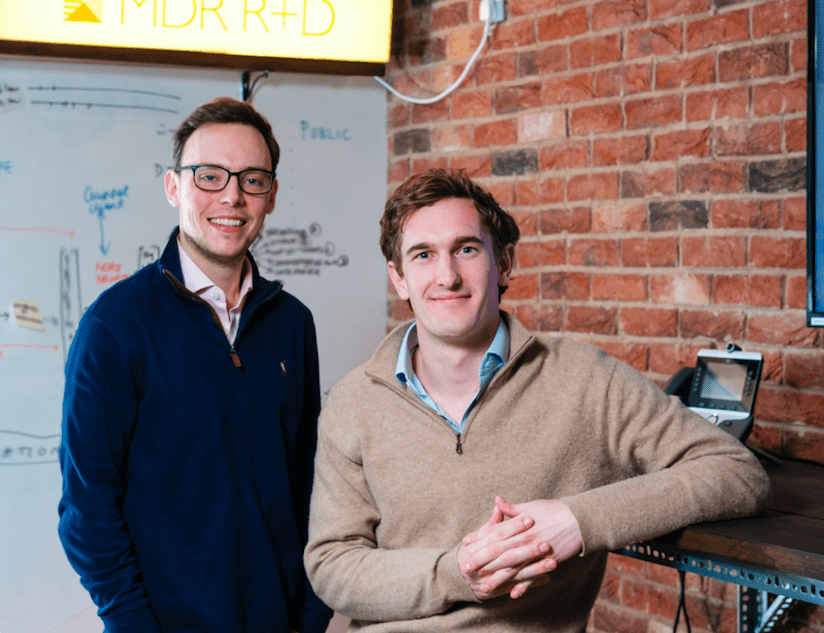
Artificial Lawyer recently caught up with Thirdfort, one of MDR LAB’s second cohort of legal tech/prop tech startups. It has the potential to be massively scalable from an early stage and it’s also using machine learning. The more you look at it the more you can see how this could catch on. Want to learn more from co-founders, Olly Thornton-Berry and Jack Bidgood (L to R pictured above)? Read on…
—
First, can you please describe what Thirdfort does?
Thirdfort is an FCA (the UK’s financial regulator) regulated payment platform to facilitate residential property transactions.
It will enable property lawyers to use a third party managed account to accept deposit and balance payments from a property buyer and transfer them directly to the seller.

Currently, money travels through at least two sets of law firms’ accounts, which is not only burdensome for the lawyers involved, but often requires account details to be exchanged via email, risking infiltration from fraudsters.
Conveyancing [the English term for transacting property] fraud is a big and rapidly growing problem. BDO found that over £200m ($262m) was stolen in property transactions last year.
Thirdfort proposes to solve this by securely holding account details and money in its platform, reducing the need for lawyers to manage the payment process themselves and freeing up more of their time to work on the legal matters.
Thirdfort will also automatically run ‘red flag checks’ on a transaction to quickly identify possible fraudulent activity thereby adding an additional layer of security for both the lawyers and their clients.
Where did the inspiration come from? How did you get the team together to develop this?
One of our friends was defrauded out of £25,000 ($32,800) whilst buying a flat in London early last year.
We were shocked and began researching and speaking with property lawyers to understand how such a fraud could occur. We realised that it wasn’t just security that was causing havoc, but the whole post-offer residential transaction in the UK has practically remained unchanged for the past 30 years.
It takes on average 12 – 15 weeks in the UK to transact, which is multiple times longer than many other countries and anyone who’s been through the process will be able to relate to its outdatedness.

We identified the movement of funds as one of the most disjointed processes, with many property lawyers weighed down by the tangled internal and external checks and balances spawned from legacy banking systems, rising fraud threats, more onerous KYC / AML and more rigorous bank lending procedures.
We have known each other for around 20 years and both shared a passion to build a revolutionary start-up. We were both at Durham University and then both worked in finance for six years.
Not coming from a legal or property background enables us to approach this problem with a fresh perspective, however the drawback is that it takes time to understand the dynamics, the expertise of different market participants and how they interact.
We are fortunate to have some great collaborators in the Land Registry’s innovation hub, Geovation who are helping build our Alpha product which we are testing with the law firm Mishcon de Reya.
We are currently taking part in Mishcon’s legal tech accelerator program, MDR LAB, which has given us fantastic insight into the conveyancing/transaction process and we feel very lucky to be partnered with such a forward looking firm that is pushing for innovation in the property space.
What has been the biggest challenge so far?
We’re selling into a market that has remained unchanged for so long that many are sceptical of new approaches that are too fundamentally different. Also, we have discovered that the market for property legal professionals in the UK is highly fragmented, with around 5,000 firms and not a single player controlling more than 4%.
We’ve spoken to over 150 firms and think we have a fair idea of challenges and how we might add value, but the network effect of our product means that is increasingly valuable to its customers as the number of users grows, so getting sufficient traction early is key.
This is going to collect a huge amount of really useful data, will there be any machine learning aspects to this?
Firstly, we’re using machine learning tech from the outset to verify people’s passports and drivers licences and compare the facial similarity with a selfie image in the same way Monzo enables users to open a bank account very quickly from their smartphone.
Secondly, we will be aggregating data from many sources to provide lawyers and their clients with a risk score that can highlight key warning signals that the likelihood of fraud may be higher than usual.
The transaction data is highly unstructured and fragmented which fraudsters exploit.
Having a single source to identify whether a property is mortgage free, the passport or drivers’ licence has recently been issued, the offer price is a material discount to market price or a seller lacks basic property specific knowledge are all red flags.
When these red flags are combined from multiple sources we can get a much better idea of how open to fraud any particular property transaction is. The more data we collect the more we can improve our models and learn about these warning signs tostop fraudsters in their tracks.
A further use case of evaluating the data we’re capturing is enabling insurance underwriters to know more about their clients’ risk management practices. If an insurer can understand the risks better this can help them more accurately price their insurance cover, which we expect will lead to a reduction in overall insurance costs for lawyers who use our system.
The company is taking part in at least one incubator at the moment, how useful do you think these are and why have you chosen to do that?
We’re fortunate to be on both the Land Registry (Geovation) and legal firm Mishcon de Reya’s MDR LAB start-up programmes, and we’re getting enormous value from both.

Geovation has provided us with technical and business support, grant funding, desk space and access to many people inside the Land Registry who are working on their five-year digitalisation initiative, Digital Street.
This support continues to be incredibly useful and sets us in good stead when we are talking to property professionals, whether they be lawyers, mortgage lenders, regulators or industry bodies.
Last question, it looks like there is huge potential to scale up this application, what is the longer term growth plan? And do you have any external investors yet?
We want to revolutionise residential settlement transactions in the UK.
The flow of money and customer ID checks are obvious pain points that we are starting with, but our ambition is to assist guiding and protecting the consumer from the point of having an offer accepted to moving in. Providing an easily accessible portal that stores data and information from their transaction that will not only make them ‘seller ready’ in future, but also be a source to access property specific docs securely when needed.
Regarding capital, we raised £100k ($131,000) from angels in January and expect to raise again in October to ramp up development and begin product roll out.
Thanks! And good luck, the real estate market needs you!
5 Trackbacks / Pingbacks
Comments are closed.